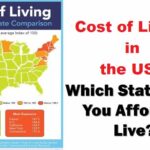The United States of America, often referred to as the US or simply America, is a dream destination for many Brazilians.
From the bustling metropolises of New York and Los Angeles to the vast natural beauty of the Grand Canyon and Yellowstone National Park, the USA offers a diverse and exciting lifestyle.
However, moving to a new country, especially one so culturally and geographically different from Brazil, requires careful planning and preparation.
This comprehensive guide will equip you with the essential information you need to navigate your journey to living in the USA.

Visas and Immigration
The first and most crucial step is securing the appropriate visa. Brazilians cannot simply enter the US and start working; a specific visa category is required depending on your purpose of residence. Here’s a breakdown of the most common visa types:
- Work Visas: These visas are sponsored by a US employer and allow you to work legally in a specific position. The H-1B visa is popular for skilled professionals, while the L-1 visa caters to intracompany transfers.
- Student Visas: If you plan to study in the US, an F-1 visa is necessary for full-time academic programs. This visa allows part-time on-campus work and potential internship opportunities.
- Investment Visas: The EB-5 visa grants permanent residency to those investing a significant amount of capital (currently $800,000 USD) in a US business venture.
- Family Visas: These visas allow family members of US citizens or permanent residents to live in the US.
Important Considerations:
- Visa processing times can vary significantly, so apply well in advance of your intended arrival date.
- Consult with an immigration attorney to determine the most suitable visa category for your situation.
- Gather all required documentation meticulously, as incomplete applications can lead to delays or rejection.
Finding a Place to Live
The US boasts a wide variety of locations, each with its own distinct character, cost of living, and job market. Here are some factors to consider when choosing a city:
- Climate: The US has diverse climates, ranging from the tropical warmth of Florida to the snowy winters of the Northeast.
- Cost of Living: Major coastal cities like New York and San Francisco tend to be expensive, while Midwestern cities offer a more affordable option.
- Job Market: Research the availability of jobs in your field and the prevailing salary ranges for your skillset.
- Community: Consider the size, demographics, and cultural offerings of a city to find a place that aligns with your lifestyle preferences.
Resources for Finding Housing:
- Online real estate platforms like Zillow and Realtor.com
- Local classifieds websites like Craigslist
- Connecting with Brazilian communities in your chosen city
Cultural Adaptation
While both Brazil and the US are melting pots of cultures, there are significant social and cultural differences to be aware of. Here are some tips for a smooth transition:
- Learn English: English proficiency is crucial for daily life and career advancement. Consider taking English language courses before you arrive or upon arrival.
- Embrace American customs: Be respectful of local traditions and social norms. Punctuality, direct communication, and independence are valued in American society.
- Build a network: Connect with people from your community, both Brazilians and Americans. This can provide invaluable support and friendship.
Building a Life in the USA
Once you’ve settled in, it’s time to focus on integrating into American life. Here are some key aspects to consider:
- Social Security Number: This unique identification number is essential for employment, opening bank accounts, and accessing government services.
- Driver’s License: Obtaining a valid US driver’s license will allow you greater mobility and independence.
- Taxes: Understand your tax obligations and file your taxes annually. Consider consulting a tax professional for guidance.
- Banking and Finance: Open a bank account to manage your finances and establish credit. Familiarize yourself with American banking practices.
Resources
- The U.S. Department of State: https://www.state.gov/ provides comprehensive information on immigration visas and the naturalization process.
- The U.S. Citizenship and Immigration Services (USCIS): https://www.uscis.gov/ offers detailed resources and application procedures for various visa categories.
- Brazilian-American Chamber of Commerce: https://brazilcham.com/ connects Brazilian businesses and professionals in the US, offering valuable networking opportunities.
FAQs
Can I work in the US with a tourist visa?
No, working on a tourist visa is strictly prohibited. You must have a work visa specifically authorizing your employment.
How long does it take to become a US citizen?
The naturalization process typically takes between 5-7 years, depending on various factors.
Is healthcare expensive in the US?
Yes, healthcare costs can be very high in the US. Consider purchasing health insurance to manage medical expenses.
What are some cultural differences to be particularly aware of?
While both cultures are warm and friendly, Brazilians may find American society to be more individualistic and direct. Communication styles can also differ, with Brazilians favoring a more indirect and relationship-oriented approach.
How can I stay updated on changes in immigration policies?
Subscribe to official USCIS updates, follow reputable news sources focusing on immigration, or consult with an immigration attorney for the latest information.
What if I don’t speak English fluently?
Many resources are available to learn English as a Second Language (ESL). Enroll in English classes before or after you arrive, utilize online learning platforms, and practice speaking with native speakers.
Are there any financial aid programs available for immigrants?
Financial aid programs are generally limited to US citizens and permanent residents. However, scholarships and educational grants may be available for international students.






